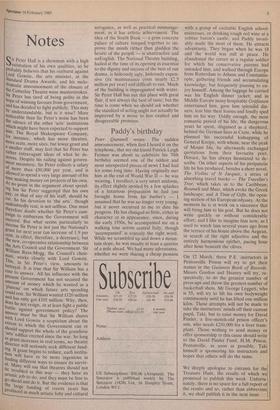Notes
Sir Peter Hall is a showman with a high estimation of his own qualities, so he probably believes that his outburst against Lord Gowrie, the arts minister, at the Standard Drama Awards, and his melo- dramatic announcement of the closure of the Cottesloe Theatre were masterstrokes. Sir Peter has tired of being polite in the hope of winning favours from government, and has decided to fight publicly. This may be understandable, but is it wise? More noticeable than Sir Peter's noise has been the silence of the other 'arts' institutions Which might have been expected to support him. The Royal Shakespeare Company, for instance, which has more theatres, more seats, more sites, but lower grant and a smaller staff, may feel that Sir Peter has rather extravagant ideas of what he de- serves. Despite his railing against govern- ment meanness, Sir Peter collects a salary of more than £50,000 per year, and is allowed to spend a very large amount of his time making money on projects of his own. At no point in the argument about spend- ing has Sir Peter suggestid that his own Pay, or that of any of his staff, should be cut. So his devotion to 'the arts', though undoubtedly real, is not selfless. One must therefore doubt whether Sir Peter's cam- paign to embarrass the Government will succeed. But what seems particularly to incense Sir Peter is not just the National's grant for next year (an increase of 1.9 per cent, in effect, therefore, a decrease), but the new, co-operative relationship between the Arts Council and the Government. Sir William Rees-Mogg, the Council's chair- man, works closely with Lord Gowrie. This, in Sir Peter's view, amounts to betrayal. It is true that Sir William has a case to answer. All his influence with the present Government has not secured the a, mount of money which he wanted as a plateau' on which future arts spending Could rest. Sir William wanted £120 million and has only got £105 million. Why, then, does he not resign, or at least fight a public battle against government policy? The answer must be that Sir William shares with Lord Gowrie a scepticism about the extent to which the Government can or should support the whole of the grandiose arts' edifice erected since the war. So long as i grant increases in real terms, no theatre rector will seriously seek different fund- ing. If grant begins to reduce, each institu- tion will have to be more ingenious in finding different ways to ensure its surviv- al. Many will say that theatres should not be troubled in this way — they have an artistic job to do, and they must be free to go ahead and do it. But the evidence is that the large funding of recent years has produced as much artistic folly and cultural
arrogance, as well as practical mismange- ment, as it has artistic achieveinent. The idea of the South Bank — a grim concrete palace of culture lumped together to im- prove the minds rather than gladden the hearts of the people — is unattractive and unEnglish. The National Theatre building, hailed at the time of its opening as essential to the dignity and success of the best of our drama, is hideously ugly, hideously expen- sive (its maintenance costs nearly £2.5 million per year) and difficult to run. Much of the building is impregnated with water. Sir Peter Hall has run this place with great flair, if not always the best of taste; but the time is come when we should ask whether the standard of acting might not actually be improved by a move to less exalted and disagreeable premises.














































 Previous page
Previous page